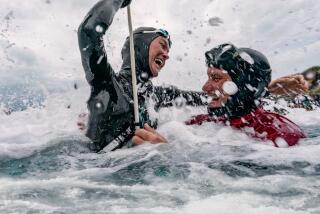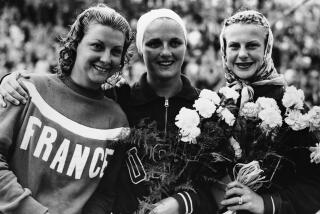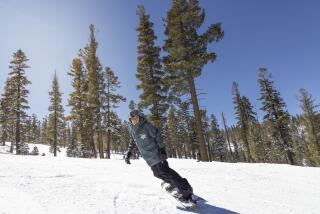Encino’s Felix Grossman Overcomes 2 Hip Operations to Win 3 Masters Diving Titles
- Share via
Felix Grossman, 55, has been athletically supercharged all of his adult life. Mountaineering. Mountain biking. Cross-country and downhill skiing. Water skiing. Competitive tennis. Springboard diving. Always in motion, as if trying to do an end sweep around Father Time, Grossman was determined to “fight old age every step of the way.”
Grossman, a former diver at Williams (Mass.) College, has kept his 5-foot-4 body in peak shape to compete in the U. S. Masters Division--age-group competition that is one step below the Olympic level. He was even able to increase the degree of difficulty in his dives, attempting maneuvers he hadn’t been capable of in college. Last month, performing like a well-maintained old Porsche, he thumbed his nose at the Golden Years, winning three gold medals at the U. S. Masters National Diving Championships in Boca Raton, Fla.
But Grossman’s feat is more than mere inspiration for 55-year-olds everywhere: It’s a tribute to medical science and his own gritty resiliency. Seven years ago, the nagging pain in Grossman’s hips turned out to be degenerative arthritis. In late 1987, unable to move without experiencing “excruciating pain,” he underwent two hip operations, surgery in which both hip sockets and femur balls were replaced by prostheses made of chromium-cobalt alloy.
“This proves that a person can overcome debilitating injury,” says Grossman, who considers himself “evangelical” about the hip operation.
But a competitive nature and athletic ability are prerequisites for making a spectacular recovery. Grossman went into both operations with a positive attitude--”I told the doctor I was going to be his best result”--and a strong body. Exercising in the pool behind his Encino house, Grossman worked hard on his abdominal, back, buttocks and thigh muscles.
“I exercised until the day before the operation,” he says.
After choosing Dr. Anthony Hedley from among five orthopedic surgeons he had interviewed, Grossman underwent surgery on his left hip. The two-hour operation took place in a Phoenix hospital in August, 1987. Ten weeks later, he returned to have his right hip remodeled. After each operation, he astounded the medical staff by doing his first independent leg lift only three days after surgery, “which was four days faster than anybody,” he says.
After each operation, Grossman had to spend six weeks on crutches, “but I expanded on the post-operative therapy,” he says. “I did a tremendous amount of pool walking.” Normally, a patient has to use a cane after putting away the crutches. But after the six weeks, Grossman was able to walk without aid. He felt so good after the first operation that “I was looking forward to the second one.”
By the first week of February, 1988--eight weeks after his second operation--Grossman was back on the diving board doing standing dives. Six months after the second operation, he was competing in the nationals, but it was a token appearance: He did only standing dives. Doing a full-frontal approach and springing off the board was beyond his capability until August, 1988, when he was able to run in Sepulveda Basin without feeling pain.
“All of a sudden, it wasn’t hurting,” he says. “I knew if I could run, I could jump.”
His recovery, says Grossman, senior partner in a downtown law firm, “was a series of logical thought processes. You have to challenge the doctor. If he says don’t do something, you say, why not?”
Grossman, who walks without trace of a limp, exercises nearly every day. He can do just about everything--he went downhill skiing last winter--but the doctor told him to retire from water skiing. “The torquing could dislocate a hip,” says Grossman, a Boy Scout leader. A year ago, he and Beverly, his wife of 32 years, went to Hawaii and Grossman learned windsurfing.
Although he was back to normal in recreational sports, Grossman knew that his comeback wouldn’t be complete until he returned to form in Masters diving. Grossman had missed the camaraderie as well as the competition. There are about 100 Masters divers--as young as 21, as old as 87--who compete nationally, and “we’re a close-knit and friendly group,” he says. Grossman, who has been competing “seriously” in Masters diving for the “last four or five years,” is a member of the L. A. Diving Team and works out in the pools at CSUN and USC.
In his age group--55-59--he competes against the same dozen divers, including Gary Bagley of San Clemente, Grossman’s friendly nemesis. Grossman has won seven national titles over the years, but in only one national championship did he beat Bagley (the 1-meter springboard in ‘85).
“Gary is the best in our age group,” Grossman says. “I wouldn’t be as competitively fired up without him. I make beating Gary my goal.”
Grossman encountered Bagley in Denmark earlier in August at the World Masters Games. Grossman was a long-shot in Denmark--it had been only two years since his first operation--but he managed a third in the 3-meter and second in the 1-meter. Bagley won both events, beating Grossman by only eight points in the 1-meter.
Grossman’s performances elated him, confirming that he was back. “I left Denmark flying,” he says.
Grossman also wowed Bagley, a Santa Monica building inspector. “I never thought he’d ever even get back on a board,” says Bagley, who has won 79 national Masters titles. “What he did was absolutely phenomenal. I kidded with him that if he got any closer to me, I was going to get me a big magnet.”
Three weeks later at the nationals--with Bagley deciding not to make the trip to Florida for financial reasons--Grossman had the field to himself, winning the 1- and 3-meter titles and also taking the gold in synchronized diving with partner John Deininger of Seattle. The wins capped “the most exciting four-week period of my athletic career,” says Grossman, whose specialty is a front 2 1/2 dive in the pike position.
Despite his born-again hips, Grossman faces dark days athletically. Although the hip prosthesis is expected to last for years, his right knee is painfully arthritic--the cartilage almost all gone--but he won’t try risky replacement knee surgery, which is not as advanced or as successful as hip surgery. “The prosthetic knee is not ready to take the strain I’d put on it,” he says.
So Grossman will endure the pain as he continues his race through life. “There comes a time,” he says, blue eyes twinkling, “when age begins to reduce athletic capability. But we’re learning that the human body at older ages is capable of extreme feats never thought possible. I don’t ever think about the future deterioration of my abilities.”
More to Read
Go beyond the scoreboard
Get the latest on L.A.'s teams in the daily Sports Report newsletter.
You may occasionally receive promotional content from the Los Angeles Times.






